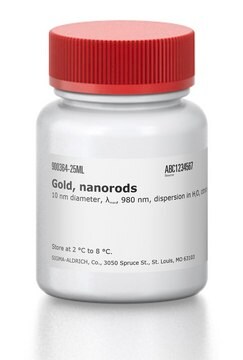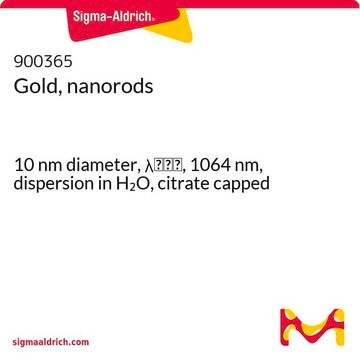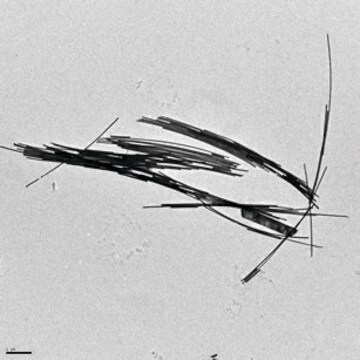771686
Gold nanorods
25 nm diameter, λmax, 650 nm, dispersion in H2O
Synonym(s):
Au nanorods, Gold nanorod
Select a Size
Select a Size
About This Item
Recommended Products
form
colloidal suspension
dispersion in H2O
nanorod
Quality Level
contains
CTAB as stabilizer
concentration
>45 μg/mL in H2O
diam. × L
25 nm × 60 nm (±10%)
diameter
25 nm
λmax
650 nm
Mw/Mn
>95 (rods)
storage temp.
2-8°C
SMILES string
[Au]
Looking for similar products? Visit Product Comparison Guide
General description
Application
Features and Benefits
Legal Information
Storage Class
10 - Combustible liquids
wgk_germany
WGK 2
flash_point_f
Not applicable
flash_point_c
Not applicable
Choose from one of the most recent versions:
Already Own This Product?
Find documentation for the products that you have recently purchased in the Document Library.
Customers Also Viewed
Articles
Gold nanostructures such as nanorods, nanowires and microgold have found applications in exciting fields such as biomedical engineering, catalysis and diagnostics.
Silver nanomaterials have unique physical, chemical, and optical properties that are currently being leveraged for a wide variety of biological applications.
Among various ceramics, one-dimensional (1-D) piezoelectric ceramics have attracted significant scientific attention for use in energy harvesting.
Recent research highlights tunable properties of inorganic nanoparticles, driving interest in optoelectronics.
Our team of scientists has experience in all areas of research including Life Science, Material Science, Chemical Synthesis, Chromatography, Analytical and many others.
Contact Technical Service![Dichlorodi-μ-chlorobis[(1,2,3,6,7,8-η-2,7-dimethyl-2,6-octadiene-1,8-diyl]diruthenium(IV) 97%](/deepweb/assets/sigmaaldrich/product/structures/183/511/879fb3f2-220a-45c9-bb2b-3799730a6693/640/879fb3f2-220a-45c9-bb2b-3799730a6693.png)



![RuCl(p-cymene)[(S,S)-Ts-DPEN]](/deepweb/assets/sigmaaldrich/product/structures/596/849/f8e3d2d8-a02e-430e-b0ed-c208cea3a6fb/640/f8e3d2d8-a02e-430e-b0ed-c208cea3a6fb.png)


